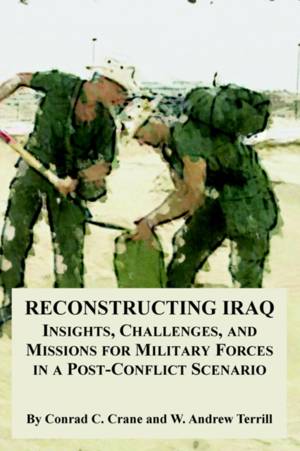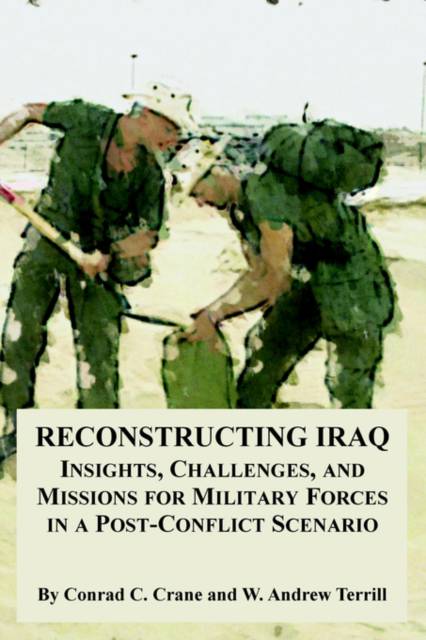
- Afhalen na 1 uur in een winkel met voorraad
- Gratis thuislevering in België vanaf € 30
- Ruim aanbod met 7 miljoen producten
- Afhalen na 1 uur in een winkel met voorraad
- Gratis thuislevering in België vanaf € 30
- Ruim aanbod met 7 miljoen producten
Zoeken
Reconstructing Iraq
Insights, Challenges, and Missions for Military Forces in a Post-Conflict Scenario
Conrad C Crane, W Andrew Terrill
Paperback | Engels
€ 22,45
+ 44 punten
Uitvoering
Omschrijving
During World War II, the U. S. military's extensive planning for the occupation of Germany was a major factor in achieving long-term strategic objectives after the war was won. More recent examples of military operations also emphasize the challenges of post-conflict operations and the criticality of detailed planning and preparation. As the possibility of war with Iraq looms on the horizon, it is important to look beyond the conflict to the challenges of occupying the country. In October 2002, the U. S. Army War College's Strategic Studies Institute, in coordination with the Office of the Army Deputy Chief of Staff/G-3, initiated a study to analyze how American and coalition forces can best address the requirements that will necessarily follow operational victory in a war with Iraq. The objectives of the project were to determine and analyze probable missions for military forces in a post-Saddam Iraq; examine associated challenges; and formulate strategic recommendations for transferring responsibilities to coalition partners or civilian organizations, mitigating local animosity, and facilitating overall mission accomplishment in the war against terrorism. The Strategic Studies Institute organized an interdisciplinary team under the leadership of Dr. Conrad C. Crane and Dr. W. Andrew Terrill. The team's initial findings were vetted at a joint and interagency workshop conducted in December. The final report of the project consists of three parts: a discussion of historical insights from 20th century postwar occupations and post-conflict operations; an analysis of the unique challenges Iraq will present for an occupying power; and a mission matrix that lists 135 specific tasks that must be performed to build and sustain a state. The matrix arrays those tasks across four phases of occupation and designates whether coalition military forces or civilian agencies should perform them. The study has much to offer planners and executors of operations to occupy and reconstruct Iraq, but also has many insights that will apply to achieving strategic objectives in any conflict after hostilities are concluded. In recent decades, U. S. civilian and military leadership have shied away from nation-building. However, the current war against terrorism has highlighted the danger posed by failed and struggling states. If this nation and its coalition partners decide to undertake the mission to remove Saddam Hussein, they will also have to be prepared to dedicate considerable time, manpower, and money to the effort to reconstruct Iraq after the fighting is over. Otherwise, the success of military operations will be ephemeral, and the problems they were designed to eliminate could return or be replaced by new and more virulent difficulties. Douglas C. Lovelace, Jr. Director, Strategic Studies Institute
Specificaties
Betrokkenen
- Auteur(s):
- Uitgeverij:
Inhoud
- Aantal bladzijden:
- 92
- Taal:
- Engels
Eigenschappen
- Productcode (EAN):
- 9781410217493
- Verschijningsdatum:
- 13/10/2004
- Uitvoering:
- Paperback
- Formaat:
- Trade paperback (VS)
- Afmetingen:
- 152 mm x 229 mm
- Gewicht:
- 145 g

Alleen bij Standaard Boekhandel
+ 44 punten op je klantenkaart van Standaard Boekhandel
Beoordelingen
We publiceren alleen reviews die voldoen aan de voorwaarden voor reviews. Bekijk onze voorwaarden voor reviews.











